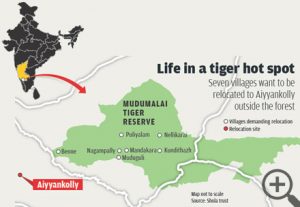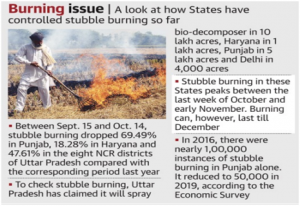INDIAN POLITY, GOVERNANCE AND SOCIAL JUSTICE
1. TUBERCULOSIS DEATHS UP IN PANDEMIC
THE CONTEXT: India is on the list of countries that contributed most to the global reduction in TB notifications between 2019 and 2020.
THE EXPLANATION:
- According to the 2021 Global TB report released recently by the World Health Organization (WHO), the COVID-19 pandemic has reversed years of global progress in tackling tuberculosis and for the first time in over a decade, TB deaths have increased.
- Worse, India (41%) was on the list of countries that topped those that contributed most to the global reduction in TB notifications between 2019 and 2020. India along with Indonesia (14%), the Philippines (12%), China (8%) and 12 other countries accounted for 93% of the total global drop in notifications.
- The WHO estimated that some 4.1 million people currently suffer from TB but had not been diagnosed with the disease or had not officially reported to national authorities. This figure is up from 2.9 million in 2019.
- The organisation added that there was also a reduction in the provision of TB preventive treatment.
SOURCE:TH
2. COMPASSION CANNOT BE FOREVER: SC
THE CONTEXT: Compassion cannot continue in perpetuity, the Supreme Court said in an order holding that Kashmiri migrants who retired as government officers cannot stay in official accommodation indefinitely.
THE EXPLANATION:
- The order was passed by a Bench of Justices Hemant Gupta and A.S. Bopanna in applications filed by retired officers occupying government accommodation in Delhi and Gurgaon. Some of these officers had been victims of terrorism and served in critical intelligence offices.
- Applicants are occupying the government accommodation at the cost of other government servants who are waiting in queue for the allotment of a government accommodation to discharge their official duties. The compassion shown to Kashmiri migrants has to be balanced with the expectations of the serving officers to discharge their duties effectively.
- The court struck down as arbitrary an office memorandum allowing government accommodation to retired employees who were Kashmiri migrants.
SOURCE: TH
ENVIRONMENT, GEOGRAPHY AND AGRICULTURE
3. TIGER MDT23 CAPTURED AFTER 22-DAY-LONG SEARCH
THE CONTEXT: After a 22-day-long operation, a tiger — nicknamed MDT23 — believed to have been responsible for the death of two herders in the Mudumalai Tiger Reserve and Gudalur, was tranquillised by the Forest Department.
THE EXPLANATION:
- Mudumalai Tiger Reserve is located in the Nilgiri district, Tamil Nadu.
- It was declared a tiger reserve in 2007.
- The Nilgiri sub-cluster (UNESCO World Heritage Site) includes the Mudumalai, Mukurthi, Nagarhole, Bandipur and Silent Valley national parks, as well as the Aralam, Wayanad and Sathyamangalam wildlife sanctuaries.

SOURCE:IE
4. FALL IN STUBBLE BURNING INCIDENTS IN PUNJAB AND HARYANA
THE CONTEXT: According to a report by the Commission for Air Quality Management, there is a 70% reduction so far in instances of stubble burning in Punjab and 18% in Haryana from last year.

ABOUT NATIONAL COMMISSION FOR AIR QUALITY MANAGEMENT
- It is a statutory body established through the recently enacted The Commission for Air Quality Management in National Capital Region and Adjoining Areas Act 2021.
- Composition: (i) a Chairperson, (ii) an officer of the rank of a Joint Secretary as the member-secretary and Chief Coordinating Officer, (iii) a serving or former Joint Secretary from the central government, (iii) three independent technical members with expertise in air pollution, and (iv) three members from non-government organisations.
- Tenure: The Chairperson and members of the Commission will have a tenure of three years or till the age of seventy years, whichever is earlier.
- Ex-office members: (i) from the central government and concerned state governments, and (ii) technical members from Central Pollution Control Board, Indian Space Research Organisation, and NITI Aayog. It may also appoint representatives of certain ministries.
- Selection of Commission: The central government will constitute a selection committee to recommend appointments of members of the Commission. The Committee will be headed by the Minister of Environment, Forest and Climate Change. Members of the Committee will include the Cabinet Secretary and the Minister of (i) Commerce and Industry, (ii) Road Transport and Highways, and (iii) Science and Technology.
- Functions of the Commission: (i) co-ordinating actions by concerned state governments (Delhi, Haryana, Punjab, Rajasthan, and Uttar Pradesh), (ii) planning and executing plans to prevent and control air pollution in NCR, (iii) providing a framework for identifying air pollutants, (iv) conducting research and development through networking with technical institutions, (v) training and creating a special workforce to deal with issues related to air pollution, and (vi) preparing action plans such as increasing plantation and addressing stubble burning.
- Powers of the Commission: Powers of the Commission include: (i) restricting activities influencing air quality, (ii) investigating and conducting research related to environmental pollution impacting air quality, (iii) preparing codes and guidelines to prevent and control air pollution, and (iv) issuing directions on matters including inspections, or regulation which will be binding on the concerned person or authority.
- The Commission will be the sole authority with jurisdiction over matters defined in the Bill (such as air quality management). In case of conflicts, the directions of the Commission will prevail over the orders of the respective state governments, the Central Pollution Control Board (CPCB), state PCBs, and state-level statutory bodies.
- Sub-Committees: The Commission is required to form sub-committees on (i) monitoring and identification, (ii) safeguarding and enforcement, and (iii) research and development.
- The commission may collect environmental compensation from farmers causing pollution by stubble burning. This compensation will be prescribed by the central government.
- Appeals against the Commission’s orders will lie with the National Green Tribunal.
SOURCE: TH
INDIAN ECONOMY
5. CAPITAL ACCOUNT CONVERTIBILITY
THE CONTEXT: Reserve Bank of India (RBI) Deputy Governor T Rabi Sankar said market participants, particularly banks, will have to prepare themselves to manage the business process changes and the global risks associated with capital convertibility.
THE EXPLANATION:
- India has come a long way in achieving increasing levels of convertibility on the capital account.
- It has broadly achieved the desired outcome for the policy choices it has made, in terms of achieving a stable composition of foreign capital inflow.
- At the same time, India is on the cusp of some fundamental shifts in this space with increased market integration in the offing and freer non-resident access to debt on the table.
- The rate of change in capital convertibility will only increase with each of these and similar measures. With that comes the responsibility to ensure that such flows are managed effectively with the right combination of capital flow measures, macro-prudential measures and market intervention.
- Convertibility refers to the ability to convert domestic currency into foreign ones and vice versa to make payments for the balance of payments transactions.
- Current account convertibility is the ability or freedom to convert domestic currency for current account transactions while capital account convertibility is the ability or freedom to convert domestic currency for capital account transactions.
SOURCE: IE
INTERNAL SECURITY
6. ENHANCED POWERS OF BORDER SECURITY FORCE
THE CONTEXT: The Ministry of Home Affairs (MHA), through a notification in the Gazette of India on October 11, enhanced the “arrest, search and seize” powers of the Border Security Force (BSF) up to 50 km from the international boundary within Assam, West Bengal and Punjab. In Gujarat, the limit was reduced from the existing 80 km to 50 km. In Rajasthan, the 50-km limit remains unchanged.
THE EXPLANATION:
- The notification replaces a 2014 order under the BSF Act, 1968, which also empowers the force to conduct counter-insurgency operations in Manipur, Mizoram, Tripura, Nagaland and Meghalaya.
- Though Jammu and Kashmir were not mentioned in the 2014 order, notification specifically mentions the two newly created Union Territories-J&K and Ladakh.
- According to a background note submitted by the MHA to a parliamentary standing committee in 2011, Under Rule 15 of the BSF Rules, 1969, the BSF has been assigned three primary tasks while deployed along the borders: promote a sense of security among the people living in the border area, prevent trans-border crimes/unauthorised entry into or exit from the territory of India and prevent smuggling and any other illegal activity.
- The violations against which the BSF carries out search and seizure include smuggling of narcotics, prohibited items, illegal entry of foreigners and offences punishable under any other Central Act.
- The MHA has given powers to the BSF personnel in border areas under the Customs Act, the Passport Act, the Narcotics Drugs and Psychotropic Substances Act, the Code of Criminal Procedure (CrPC), Registration of Foreigners Act, 1939, the Central Excises and Salt Act, 1944, the Foreigners Act, 1946, and the Foreign Exchange Regulation Act, 1947.
- The BSF does not have police powers; after apprehending a suspect it can only conduct “preliminary questioning” and has to hand over a seized consignment or the suspect to the local police within 24 hours. It does not have the power to prosecute crime suspects. Police is a State subject under the Constitution.
- The amendment establishes uniformity in defining the area within which the BSF can operate and also to improve its operational effectiveness in curbing trans-border crimes. The operational writ of the BSF was different in different Border States and the fresh notification ends this anomaly.
- The two States- Punjab and West Bengal, have termed the MHA’s move an attack on federalism.
ABOUT BSF
- The BSF is a central armed police force (CAPF) that functions under the Union government. It was raised in 1965 in the aftermath of the India-Pakistan war.
- The BSF Act was passed by Parliament in 1968 and the rules governing the Act were framed in 1969.
- The MHA issues all orders pertaining to the BSF and other CAPFs such as the Central Reserve Police Force (CRPF), SashastraSeema Bal (SSB), Indo Tibetan Border Police (ITBP), Central Industrial Security Force (CISF), National Security Guard (NSG) and Assam Rifles.
- India is a Union of States and under the One Border One Force policy, the BSF is deployed along the Pakistan and Bangladesh borders.
- It is also deployed in areas affected by Left Wing Extremism (LWE) and is routinely deployed for election and other law and order duties on the request of State governments.
SOURCE:TH
PRELIMS PRACTICE QUESTIONS
Q1. Consider the following statements with respect to the concept of Convertibility in the Indian economy.
- Convertibility refers to the ability to convert domestic currency into foreign ones and vice versa to make payments for the balance of payments transactions.
- Current account convertibility is the ability or freedom to convert domestic currency for current account transactions
- Capital account convertibility is the ability or freedom to convert domestic currency for capital account transactions.
Which of the statements given above is/are correct?
a) 1 only
b) 1 and 2 only
c) 2 and 3 only
d) 1,2 and 3
ANSWER FOR OCTOBER 15, 2021 PRELIMS PRACTICE QUESTIONS
ANSWER: C
Explanation:
- Statement 1 is correct: One Health is a collaborative, multisectoral, and transdisciplinary approach— working at the local, regional, national, and global levels — with the goal of achieving optimal health outcomes recognizing the interconnection between people, animals, plants, and their shared environment.
- Statement 2 is correct: This concept is used by the Food and Agriculture Organization (FAO), the World Health Organization (WHO), and the World Organisation for Animal Health (OIE). In India, it is a component under the National Mission on Biodiversity and Human Well Being.


